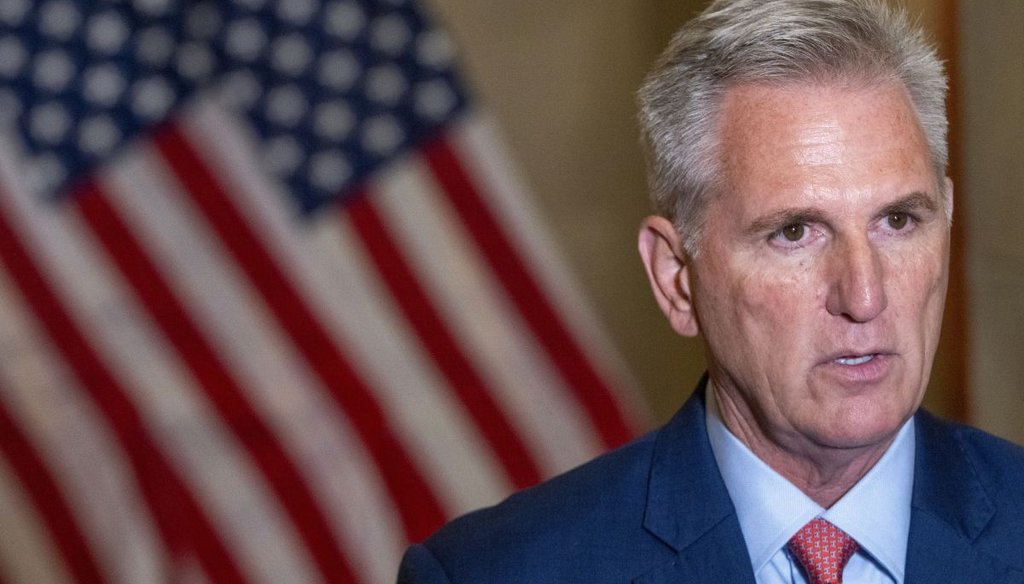Stand up for the facts!
Our only agenda is to publish the truth so you can be an informed participant in democracy.
We need your help.
I would like to contribute

Speaker of the House Kevin McCarthy, R-Calif., speaks at the Capitol on Sept. 12, 2023, announcing an impeachment inquiry of President Joe Biden. (AP)
House Speaker Kevin McCarthy has asked the House to open an impeachment investigation into President Joe Biden, accusing the president of lying about knowledge of his family's foreign business dealings — something the Biden administration forcefully denies.
House Republicans have already spent months investigating Hunter Biden, primarily over money he received when on the board of Burisma, a Ukrainian energy company, and when Joe Biden was vice president, helping to direct U.S. policy for Ukraine. These probes have so far produced no evidence of wrongdoing by the president.
In a four-minute address Sept. 12 at the Capitol, McCarthy said the committees on Ways and Means, Oversight and Judiciary will lead the investigation. McCarthy said earlier House investigations have found payments they deemed suspicious that were directed to Biden family members and associates through shell companies. He also said U.S. banks had flagged transactions involving the Biden family and other business associates as suspicious.
"Despite the serious allegations, it appears that the president's family has been offered special treatment by Biden's own administration, treatment that not otherwise would have received if they were not related to the president," McCarthy said, later adding, "This logical next step will give our committees the full power to gather all the facts and answers for the American public."
McCarthy’s move came without a vote, which countered his previous assertion that he’d hold one before opening an investigation. The move also reversed McCarthy’s position from 2019, when he criticized Democrats, including then-House Speaker Nancy Pelosi, for initially forgoing a vote as they moved to impeach former President Donald Trump. (After criticism from McCarthy and others, Pelosi did eventually hold a vote.)
In acting without a vote, McCarthy also broke from the impeachment processes for former Presidents Richard Nixon and Bill Clinton, University of North Carolina law professor Michael Gerhardt told PolitiFact last week.
McCarthy didn’t rule out a vote, but didn’t rule one in eventually, either. But a vote, if one is eventually held, would likely be hard to win. Eighteen House Republicans represent districts that voted for Biden, and most Biden voters have no desire to impeach the president.
The impeachment inquiry will let the House widen its investigative focus beyond Hunter Biden, to include alleged misdeeds by Joe Biden, including any way Joe Biden could have benefited from, or advanced, an alleged Ukrainian bribery scheme. Bribery is specifically listed in the Constitution as grounds for impeachment.
The inquiry, the first formal step toward impeachment, could also give investigators wider latitude to demand documents from the White House.
McCarthy’s move comes amid pressures both economic and political. His caucus’s right flank includes lawmakers who wanted the Biden impeachment investigation. Many of those same lawmakers also want deep spending cuts, at a time when Congress is struggling to extend government spending in the face of a possible shutdown at the end of September.
And McCarthy’s position is perilous. All that would be needed to oust McCarthy is for one Republican member to propose a "motion to vacate" the speakership. A vote would then be held on whether McCarthy would keep the speakership, and he might have trouble winning that vote.
Here is an overview of what could be in store with the impeachment process.
What’s the difference between an impeachment inquiry and impeachment?
Setting in motion an impeachment inquiry is a preliminary step and does not lead inevitably to a formal impeachment vote. Specific charges need not be presented before a vote to launch an inquiry; the inquiry is designed to collect evidence.
"The scope can change in the course of an investigation," said Stephen Griffin, a Tulane University law professor.
Formally impeaching the president would take place in a subsequent vote, after the investigation has been completed and after the committee responsible for the inquiry advances specific impeachment charges — such as obstruction of justice or bribery — to the full House.
"The scope of the inquiry could be very broad and even amorphous at the outset, but by the time a committee takes a vote on impeachment articles, it tends to be more focused," Gerhardt said.
What would the impeachment investigation look like?
It’s unclear whether the impeachment investigation would prioritize closed-door meetings or public hearings. Ultimately, McCarthy would play the key role in deciding.
There are not many historical precedents, Gerhardt said, "so it is hard to generalize" how a formal investigation would play out.
"Generally, when committees investigate, including for impeachment, they hold public hearings with fact and expert witnesses, though it is common to hold closed-door depositions or hearings when very sensitive material, particularly concerning national security, is the subject," Gerhardt said.
A closed-door phase would provide benefits to House Republicans, Griffin said, because it could provide a better idea of what witnesses have to say before calling them to testify at a public hearing.
A lot depends on what Republicans are trying to accomplish, said Frank O. Bowman III, a University of Missouri law professor and author of "High Crimes & Misdemeanors: A History of Impeachment for the Age of Trump."
"If they are really trying to discover facts, starting with document requests and private depositions makes the most sense," Bowman said. "On the other hand, if they don't really expect to discover anything of real consequence, they may just want to make it all public so they can turn the hearings into festivals of screaming accusations from the dais."
It’s also unclear how long the investigative process could take. For now, Bowman said, it appears that "the House has nothing," suggesting to him that the point of the investigation would be "to create smoke. Therefore, the amount of time will be based purely on the desired political effect."
James Robenalt, a partner at the law firm Thompson Hine and specialist in Watergate legal history, said that if Republicans really intend to impeach Biden, one hurdle will be finding something Biden has done during his presidency.
The idea of impeachment among the framers of the Constitution "was to punish officials for abuse of office, not for conduct in the past," Robenalt said. "They can’t impeach him as vice president now that he is no longer in that office."
Overcoming that obstacle would require finding ongoing financial corruption by Joe Biden during his presidency, or perhaps some improper interference in Hunter Biden’s criminal investigation over tax and gun charges. IRS whistleblowers have alleged that U.S. Attorney for the District of Delaware David Weiss, who has been prosecuting Hunter Biden, was blocked from pursuing some investigative leads and prosecutorial tactics.
What criticism is the impeachment push getting?
The White House has cast the impeachment effort as a way for Republicans to try to create false equivalence with Trump’s four simultaneous indictments. Trump is the front-runner for the 2024 Republican nomination and is on track to be Biden’s opponent for a second term.
Ian Sams, White House spokesperson for oversight and investigations, wrote on X that the impeachment effort, particularly without a vote, was "extreme politics at its worst."
The White House, and moderate House Republicans, aren’t the only sources of skepticism. A number of Republicans in the Senate, which would try Biden if he’s impeached, have expressed concern about a House impeachment effort.
When McCarthy was still considering how to approach impeachment, Sen. Shelley Moore Capito, R-W.Va., told The Hill, "I don’t know what the evidence is, where they’re going with this. I’m going to default to the position that the House is going to do what the House is going to do, and we’ll have to react to that."
And Senate Minority Leader Mitch McConnell, R-Ky., told The New York Times, "This is not good for the country."
Even if all Senate Republicans were to vote to convict an impeached Biden, the GOP would need to flip 15 Democrats and all three Democratic-caucusing independents, an almost insurmountable hurdle.
Robenalt said that given what is known now, an impeachment "will be seen as purely political" and "will galvanize Democrats and Independents."
Our Sources
PolitiFact, A possible impeachment of Joe Biden. What to know, Sept. 11, 2023
The New York Times, McCarthy, facing an ouster and a shutdown, orders an impeachment inquiry, Sept. 12, 2023
MSNBC, GOP Rep. Ken Buck calls Marjorie Taylor Greene's comments on timetable for Biden impeachment inquiry 'absurd,' Sept. 12, 2023
Annotated Constitution, accessed Sept. 12, 2023
X post, Rep. Loren Boebert, R-Colo., Sept. 12, 2023
X post, Rep. Marjorie Taylor Greene, R-Ga., Sept. 12, 2023
X post, Ian Sams, Sept. 12, 2023
The Hill, Senate GOP unhappy with McCarthy on impeachment inquiry: ‘It’s a fool’s errand,’ Sept. 12, 2023
Politico, Impeachment won’t solve McCarthy’s spending problem, Sept. 12, 2023











































